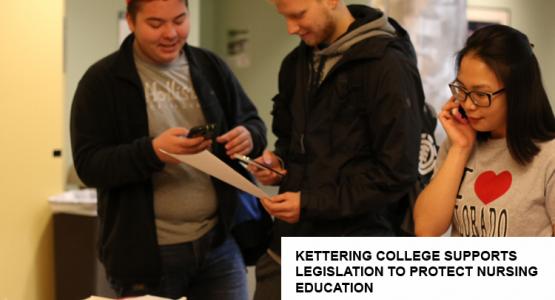
Kettering College Supports Legislation That Would Protect Funding for Nursing Education
Kettering College students, faculty, alumni and staff have been working behind the scenes to support federal legislation that would protect funding for nursing schools nationwide. Their grassroots efforts are paying off—as of March 3, legislators from both sides of the aisle have introduced related bills in the United States Senate and House of Representatives.
Story by Leigh Wilkins / Photos by Breana Soliday Haughton
An issue is funding for hospital-based nursing education programs like the one at Kettering College in Dayton, Ohio. In order to receive funding from the Centers for Medicare and Medicaid Services (CMS), such programs must be part of a hospital. However, new standards issued by the Higher Learning Commission (HLC) – the largest accrediting body for higher education – require hospital-based programs to become separately incorporated in order to retain accreditation.
Due to these conflicting standards, more than 100 nursing education programs are at risk of losing crucial funding, a problem that could result in significant tuition increases and program cuts. In mid-2014, Kettering Adventist HealthCare Network’s Jarrod McNaughton, vice president of missions and development, and PJ Brafford, manager of government relations, began working with others in the network to make lawmakers aware of this problem.
A first step was for Nate Brandstater, Kettering College president, to call and visit numerous congressional offices in Washington, D.C. And he wasn’t the only one: people affiliated with other nursing schools and health-related organizations also were voicing their support of legislative action. In July 2014, Aaron Schock (R-Ill.) introduced the Making the Education of Nurses Dependable for Schools (MEND) Act, which would revise CMS requirements so that the agency could continue to support hospital-based nursing schools that re-incorporate independently to maintain HLC accreditation.
The next step was to encourage the Kettering College family to speak out through two “call campaigns.” “Students were the first group that came to mind because they are impacted in the most direct and immediate way,” Brafford says. “Bringing Kettering College faculty and staff into the mix, along with network executives and employees, was a natural next step. Everyone at Kettering Health Network recognizes the importance of affordable, high-quality medical education to ensure that we have enough professionals to meet the long-term needs of a changing population.”
The call campaigns took place at the college on Sept. 30-Oct. 1, 2014, and February 18-19, 2015. School officials set up a communications area on campus, and invited students, faculty, staff, alumni and network employees to stop by and make phone calls to legislators’ offices and tweet their support of legislative action. The school provided all of the messaging and contact information, including phone numbers and Twitter handles for members of congress.
“Students were nervous, but once they realized how easy this was, they quickly became comfortable with idea,” says Nate Brandstater, president of Kettering College. “It was empowering for them to play a role in influencing our elected officials to address this important issue.”
Hundreds of calls and tweets later, significant progress has been made. Since the fall call campaign, many new cosponsors have added their names to the house bill . That bill is awaiting a hearing in the house ways and means committee. On March 3, Ohio Senators Rob Portman and Sherrod Brown introduced the MEND Act in the U.S. Senate. They are gathering support for the bill, which mirrors the house bill and currently has six co-sponsors.
Brandstater says he is optimistic that lawmakers will enact legislation to preserve the vital funding. “This experience has really highlighted to me how important it is to nurture relationships with our elected officials, who can be extremely helpful when critical needs arise,” he said. “The fact that the issue we’re trying to address is well understood, broadly supported and not controversial makes it easy for elected officials to get behind it. We are extremely grateful for their support of affordable education for our nation’s future healthcare providers.”


Add new comment